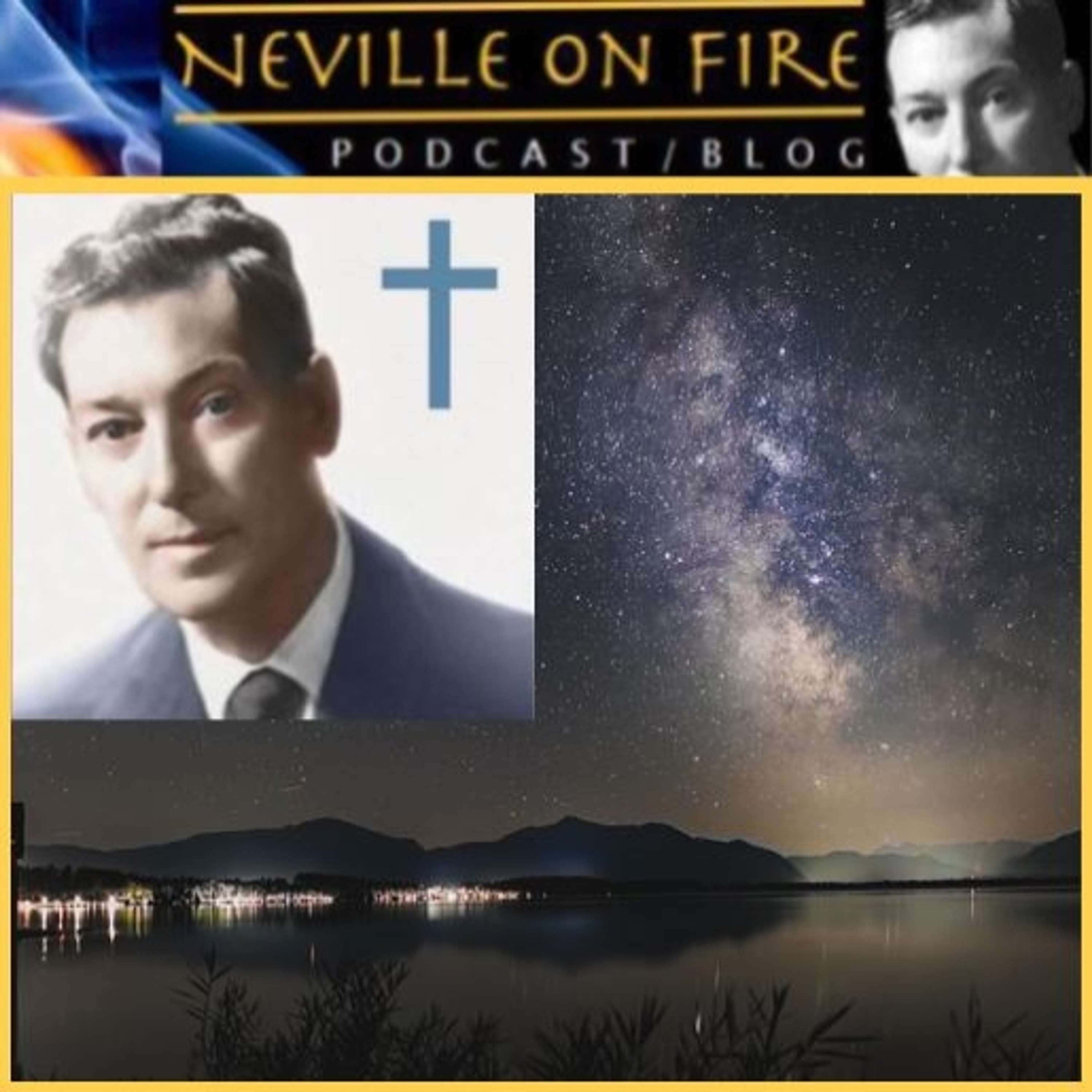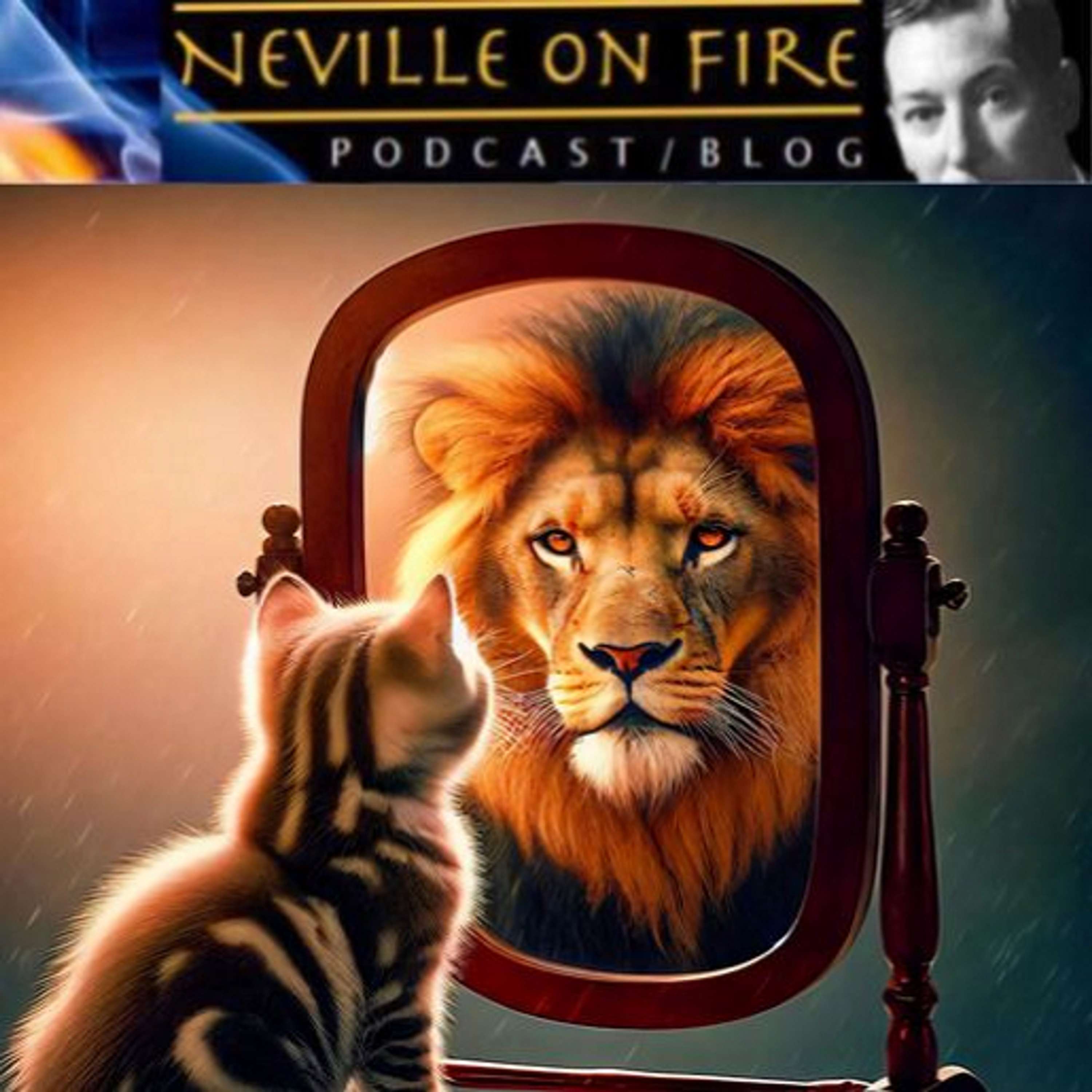Show Notes
1. Mind model
i. Personality (Artificial) and Essence (Genuine; Higher Self)
ii. Subconscious
iii. Conscious
2. Relaxation
3. Receptivity and acceptance
4. Connection: "let this mind be in you..."
5. Seeing through evil
6. Extraordinary persistence plus understanding
7. Purity: realization that imagination is the sole cause
8. Revealing the good
9. Gratitude: “the highest form of acceptance is thanksgiving“
10. Rather than mere belief in God, invoke experience of God
11. We don’t work for results
12. Switch on the light; rise above shortcomings and make the connection
Summary: Review of episodes
RESOURCES
Robert A. Russell
You Can Get What You Want, If You Find it Within Yourself
-audiobook, narrated by Barry Pederson (Youtube channel: Giving Voice to the Wisdom of the Ages)
Comments:
I drew on ideas from Russell in this episode. He was an Ecumenical minister. Of course, his concept of Jesus (evidently) as an historical personage does not accord with Neville's view; nor is it necessary to consider evil spirits as actual separate beings (as opposed to merely negative tendencies within the psyche). Those points aside, I think you will find what he says supports and complements Neville's message really well.
I don't think there's anything wrong with using Neville's concepts when listening to Russell: i.e., awareness of being, pure consciousness is God; while the faculty of human imagination is Christ Jesus.
So often in our discussions we are dealing with the ups and downs, the doubts, the negative inner talk, etc. We often despair that we cannot seem to appropriate fully the desired end state, because the evidence of the senses is too powerful; despondency ensues. Well, consider Russell's advice on how to clean house and maintain the right attitude. I hope you find it useful!
Show Transcript
[edited for clarity]
This is E10 Keeping the Connection.
In this episode, we'll first look at a model of the mind and then we'll go to practicalities with the view to maintaining the connection to the higher.
So what does the mind really consist of? Is it possible to make a comprehensive theoretical model? It's going to be very difficult because there are so many different systems. Somehow we have to get a hold of some definitions, even if it's only on a provisional basis. Why is that necessary? Because if you don't do that, if you don't differentiate different aspects of your mental experience, then you simply run the risk of being a mass of undifferentiated and misunderstood mental experience.
You'll be at the mercy of ordinary life, all of its influences. You'll be at the mercy of internal, detrimental suggestion; propaganda, control systems, etc. You have to have some way to clarify your own mental experience and then exercise discrimination and selection.
1. Mind Model
I'm going to describe three aspects of the mind, and in these definitions, I'm going to make sure that each one pertains to something that we experience, rather than something that is only theoretical.
i. The first aspect is what we experience naturally, which we usually take to be ourselves in our habitual waking state. And that can be called personality. You could also call it false personality, or the surface level of our being, as Neville puts it. Now, in many ways it's an artificial construct because it consists of overlays of data that we've acquired from childhood, through society and all of its various institutions. So while part of it consists of useful, practical learning, a lot of it, f it were suddenly flooded with conscious awareness in a given moment, it would for the most part just dissolve and fall apart -- because at the root of it, it's false, simply not substantial.
Now, the personality is usually in a passive state. It's sort of the plaything of outer circumstances or a function of its environment. We call it the subjective mind. It's subject to all these influences. Another important aspect of this personality is that it's fragmented, it has many different sub identities that come up in different situations; and it's mostly involuntary. It's in a state of hypnotic sleep, and it doesn't have sovereignty.
So this aspect of our being is what scientists normally call consciousness, and it's distinctly not consciousness. That's really a misnomer. And you might object and say, well, wait a minute, I'm conscious of eating my breakfast and going to work and doing all this stuff. Well, of course that's true. What that means is we have, in this normal waking state, a certain minimum of awareness of being. So that we can say, well, this is our conscious mind, in so many words. And yet once we get to the definition of consciousness in its true aspect, then we'll be able to see that our habitual state is not conscious.
So let's continue to describe this personality a little bit further. We said that it was fragmented. We have a divided mind, and we can see that when we observe ourselves, we might see conflict between what the instincts want versus what the ego wants, versus what the intellect want, versus what the spiritual self wants, and so on. So in that sense, it's a picture of fragmentation and conflict.
At the same time, the picture is not all dark, because there's a real or genuine aspect to a person's psyche, is there not? We could call this essence. You can see the essence in children. It's the genuine, completely guileless aspect of our being. Now, what happens is it can gravitate in adult life towards, let's say, practical life skills. But as a rule, this genuine core called essence, it gets marginalized or buried. And that's because there's very little in our culture or our conventional education to feed it and to help it grow.
But this real aspect of our being is exactly the one that we're interested in. It's the one that responds to the whole project that we are engaged in, when exploring Neville's ideas.
ii. The second major aspect of the mind that I want to discuss is the subconscious. Now, this seems to be the aspect that runs all the involuntary functions, records the entire contents of our experience in memory. But it's also a creative workshop. We learned from Neville that it takes desires, the things which we deliberately instruct to the subconscious, or the things that we consent to and accept as true, and it works them up into manifest reality.
It's also, according to some systems, like a conduit through which we received the messages from the highest aspect, God himself, through dream images, intuitions, and so on.
So both the first aspect that we discussed, that is personality, and the second one, the subconscious, are characterized, if I understand Neville rightly, as the subjective mind. Why are they both called the subjective mind? Because they're both subconscious. They're both susceptible to suggestion, whether that suggestion originates from within or from without.
Well, the advice that we took with regard to the subconscious so far in this podcast series is that we want to try to develop a rapport with the subconscious. We want to notice what it brings up and presents to us, and suggests to us -- what we need to pay attention to. Secondly, we need to remove it from negative and harmful suggestion, and we need to direct it through persuasion and positive affirmation.
If there was nothing else in this picture of the mind, we would simply then be going around in circles in this vicious cycle with the service personality pursuing its ordinary life aims, while being subject to all the sort of internal harassment and fragmentation that the personality and the subconscious consist of. This is where the third aspect comes in.
iii. This aspect is what we can properly call consciousness. So consciousness, as we're using the term, has to be learned through direct instruction. That was what E1 was all about. It is wordless, a vivid apprehension of everything going on in the mind. It enables -- or it is actually itself -- awareness of being. So rather than being a compartment or a function of the mind, like speech or a memory or something like that, it's more like a quality that is appealed to, experienced and then brought to bear on our mental activity.
So in our model of the mind here we have personality, which has sort of a functional minimum of awareness and a genuine core called essence, which is seeking truth. And then the second aspect was the subconscious, which is a continuation of the same mind, but existing sort of below the threshold of awareness (except as we become aware of everything that it tends to throw to the surface for our consideration). And finally, we have the consciousness, which is awareness of being. And this is the magical thing that starts to transform everything in the whole mental economy, from that point that we learn it going forward.
At this point, you might ask, well, wait a minute. What about the human imagination? Where does that fit into the mental economy or the mental model? And the answer is that if you remember what we were saying back in E5 with regard to twelve disciplines of mind, the imaginative faculty is running amok. It's running on autopilot in our normal state. That is, it doesn't have the benefit of conscious direction. That's the reason we see a world that is manifesting so many undesirable circumstances and situations. And yet that very same aspect, when brought to conscious use, when deliberately employed to create positive things, becomes our most valuable asset.
This picture of the mind that I've presented, you can see in your daily activity: what the personality consists of; how you are responding to things; and at the same time, how you can invoke consciousness, become self aware and self remember. From that position, you can really start to be effective in understanding and applying Neville's principles of the human imagination.
So let's turn our attention now to maintaining our connection to that higher state, to the divine within us.
2. Relaxation.
I can recommend that you try to find a program of progressive relaxation, whether that's in yoga or some other discipline, to make sure that you can invoke that and relax yourself physically in all various situations. The reason for that is so much unconscious manifestation is bound up with tension in the body. That is, some psychological aspect is expressed through tension in the body that we're not aware of. So if you work from the body relaxing, you can sort of go backwards, as it were. You become more aware of, and help to release and resolve various aspects of tension in the psyche. This leads to the next point, receptivity.
3. Receptivity and acceptance
There's a strange kind of reversal here, because on one hand, we're trying to influence the subconscious, we're trying to make an affirmation -- and yet the whole thing lies in appropriating the state, simply stepping into the state of the thing already fulfilled.
If we're receptive, then we can see this idea of the thing that we want already existing in eternity. It already exists, in creation. It's simply not manifest, because it hasn't been called into the world. As we become receptive and relaxed, then we have much more confidence that the thing that we are focusing on has the property of already existing.
Neville makes several references to accepting, to the acceptance of the desired end. And this is so much easier with cultivating our receptivity that is grounded in relaxation. Of course, all of this is carried out in a self aware state. So you're focusing on the higher, on your faith in the unseen, faith in the creative principle -- and thereby removing your faith in human wilfulness.
4. Connection: "let this mind be in you..."
The next point is connection: “Let this mind be in you...” You can check that quote from Scripture. The whole idea is sort of an “on-off” situation. It's a connection that you establish with the higher in a moment's notice. And either the connection is there, because you're self remembering, you're self aware, and you feel connected with the source, or you're in a state of forgetfulness, and therefore the connection is “off”.
Once that realization occurs and you've established the connection, then it's so much easier to follow Neville's advice and to carry on in a state of confident expectation. The next point is seeing through evil.
5. Seeing through evil
Well, we've already discussed quite a bit about the concept of denial, that is deliberate, conscious denial of something that we might see projected in front of us on the screen of space -- some event or occurrence in the world that we don't accept. So we want to remove our attention from it. Now, in the first instance, this will be kind of a struggle, because it's impressing itself upon our consciousness. We see it, and so we, through habit, tend to take it as real.
And yet the more advanced practice in this, as far as I can see, is to face the thing, face the evil thing. From this position of receptivity, self remembering and relaxation, we can see through the evil to the spirit back of it. We know that God has created the whole picture. And so if we look at this event or circumstance, we can face it without any fear, and just see right through it -- and then continue in confident expectation that what we truly desire will eventually manifest.
What happens is quite naturally when we get better at invoking self awareness, self remembering, relaxation, the subconscious pipes up and says, okay, what about this? And you find yourself back, as we discussed in E3, struggling with the vicissitudes, the ups and downs. In this case, you just have to realize that the project consists of normalizing and neutralizing aspects of the personality through this conscious work on oneself.
6. Extraordinary persistence plus understanding
Here I want to draw your attention to something we could call extraordinary persistence. Persistence in the normal sense is like this: something gets difficult, the going gets tough. You put in some extra effort, get over the hurdle and you're good. Well, that's not extraordinary persistence.
What we need is absolute, extraordinary, extreme, unequivocal, and uncompromising persistence. You just have to keep invoking consciousness, keep focusing on what you do want, remembering that everything is just a state of mind. And if you can escape from a negative state of mind by remembering yourself and focusing on the good, then eventually it's going to stick. Eventually you're going to overcome and win out the battle.
Now, on one hand, once you have a victory in, let's say, an extraordinary in-rush of conscious experience (that will be unmistakable) or a victory in an extraordinary manifestation -- well, this is all good. But if you don't have the other aspect that we've been focusing on in this podcast series, that is, an understanding of what you're doing, then you won't make it. It's your understanding that will overcome the fact that you're in a bad state and you need to get out of it.
So extraordinary persistence, and your understanding of what you're doing -- those two things together are going to be much more effective than willpower in the normal sense.
7. Purity: realization that imagination is the sole cause
One aspect of that understanding has to do with what Neville talks about in a lecture on purity of heart. In a previous episode, we were talking about purity and humility, and how they're taken in a moral sense. Actually, purity has nothing to do with a moral connotation. In Neville's correct translation and explanation, he says purity has to do with the fact that you understand, without any equivocation, that it is the human imagination that is the sole cause of reality.
Once you have that unshakable understanding, then it's going to be much easier to persist. So we could talk about the tyranny of the false personality, all the conflicts and the personality that we have to somehow rise above. But Neville characterizes the greatest tyranny in the world as the belief in secondary causes.
8. Revealing the good
The next point that I want to make has to do with another aspect of receptivity and allowing, or relaxation and surrendering: it has to do with the fact that instead of chasing after something the way we normally think of accomplishing something, what we want to do actually is reveal the good that is already there.
We want to reveal the state of good health; reveal the desired end. How can we reveal the desired end? The fact is that it's already in eternity, it's already in potential, or in creation. Neville explains that by saying that all of creation is complete and rooted in the psyche of man. We wouldn't be able to even conceive of something to manifest were it not already existing in this other plane.
9. Gratitude: “the highest form of acceptance is thanksgiving“
Another aspect of maintaining the connection that we're seeking is to use gratitude. Now, that was one of the disciplines that we discussed back in E5. What I've discovered is that gratitude, or thankfulness in the normal conception, is quite far removed from what he's talking about.
The author, Robert A. Russell, said, “the highest form of acceptance is thanksgiving”. All right, so there we see that gratitude (thanksgiving) is actually a form of acceptance. It's a form of connecting yourself more deeply with the divine, with the conscious source, with God. And that is the great virtue in cultivating gratitude, in advance of the thing being delivered or being manifest in your world.
You know, the expression of gratitude, thankfulness for something that you have not received yet, in some sort of affirmation or deliberate [pronouncement] in consciousness, in self remembering, is a very powerful exercise. The reason I say that is because it gives you an experiential understanding of how the creative principle actually works.
This is shown in that story in the Bible where the Roman Centurion asked Jesus to cure his servant, and Jesus says, okay, take me to him. The centurion and says, no, just say the word, and I know that it's done. And Jesus, which as we understand it is the human imagination, says [in so many words] “that is real faith”.
It's not faith in the sense of mere belief. It's faith in the sense of a conviction, a knowledge of how things work.
10. Rather than mere belief in God, invoke experience of God
Russell makes a point that's very closely connected with that. He says, the problem with most people is that they rely on a belief in God -- just a mere belief -- as opposed to an experience of God invoking an experience of God in the moment.
11. We don’t work for results
Another aspect of maintaining this connection, comes from a precept in the Fourth Way, where, again, we divorce ourselves from the stance of human wilfulness, and go into more of a state of faith.
They say “we don't work for results”. So there’s a sort of curious reversal. We don't work for results, we just do the work, with the faith that the results will come. Well, both Neville and the author I quoted a second ago, Robert A. Russell, draw our attention to something in Scripture where it says: God already knows what you want before you ask for it. I forget the exact quotation, but I'm sure it's familiar to you. So Russell says, if that's the case, then why are we persisting in trying to make affirmations and convince God of something that we want, when he already knows; he already has the knowledge?
Taking that psychologically, it does make sense, because if we already have awareness in ourselves of what we want, then what are we doing? Trying to pronounce it, affirm it, assert it, and persuade... somebody. But we're already persuaded, we already know. I think that is yet another way to strengthen that solid connection that we're seeking. The “on” position, that is, the conscious state in the moment.
12. Switch on the light; rise above shortcomings and make the connection
The trouble is, I think we become almost habituated or even addicted to the idea of struggling against ourselves, of working on ourselves, of trying to realize the negative aspects and dissipate them or neutralize them or something like that. Whereas, the whole operation mentally, psychologically, is to simply switch on the light switch. They say you don't need to shovel the emptiness out of a bathtub before you fill it with the water of truth. You don't need to shovel the darkness out of a room before you switch on the light.
So it's not at all necessary to keep focusing, in a morbid way, on the foibles of the personality, the false personality. We simply focus on rising above, and making that connection, in self remembering and faith.
Summary: Review of episodes
Looking back over the last ten episodes, we started with a crucial exercise in how to approach awareness of being -- consciousness, self awareness -- which is given from an authoritative source.
In E2, we explored the idea that the world, although it appears without, is actually within.
Then we dealt with methods and techniques, and the difficulties you can encounter with them, over the next four episodes (E3-6).
In E7-9, we looked at Neville's ideas from the standpoint of traditional religion, and tried to paint a picture of his worldview.
Finally, today (E10) we looked at a refinement of technique and method, where we try to establish the connection with the higher source, and maintain that connection through all of the ups and downs and difficulties of the way.
Yet we realize that, in the end, it's really a shift in our understanding that leads us to the necessary discipline, as well as surrender, and experience of grace, to renew and transform our minds.
I really hope you found the information useful!
Listen On
Also Listen
-

Who is Man? Neville’s Radical Answer
Book draft chapter 1. S1E01 revised, inviting your comments.https://nevilleonfir -

The Power of Noticing: How to Interrupt Mechanical Life
Conscious intervention is required for psychological growth. -

Let Go to Move Ahead: Neville and Sedona
First, review of first 15 episodes Season 2. Then explore incremental psychologi -

Conscious Self Persuasion
Science tries to define consciousness where it does not exist, and hypnosis whil


Comments & Upvotes